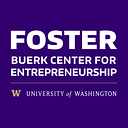Waste Reduction Shines at 2024 Alaska Airlines Environmental Innovation Challenge
Team AgroFilms won the $15,000 Grand Prize for its biodegradable mulch film
Written by: Charles Trillingham, Buerk Center for Entrepreneurship
Plastic might not be the most searched topic on the internet, but it certainly represents a huge environmental and health concern for tens of millions of people. Multiple prize-winning teams in the 2024 Alaska Airlines Environmental Innovation Challenge (EIC) aim to revolutionize the way plastic waste is managed. Team AgroFilms won the $15,000 Grand Prize for its biodegradable mulch film that can be used in both traditional and organic farming, where plastic waste production can be a huge problem.
The University of Washington team of bioresource science and engineering graduate and undergraduate students, along with a technology management MBA student, earned the award after impressing judges in the competition hosted by the UW Foster School’s Buerk Center for Entrepreneurship. AgroFilms takes an innovative low-cost approach to creating their mulch film that they believe will result in keeping plastic waste from farms out of landfills, while also contributing to the circular economy.
Judges awarded $42,000 in prizes in the 16th year of the EIC. The $10,000 Herbert B. Jones Foundation Second Place Prize went to team C-1 Bio from UW for its technology that converts carbon dioxide emissions from industrial waste into valuable chemicals in a sustainable way. The innovative approach using synthetic biology also won C-1 Bio the $2,500 Eric Carlson Best Idea for Climate Impact Prize. That prize is awarded to a team that has thoughtfully incorporated and quantified carbon footprint into the development and communication of their innovation.
C-1 Bio featured a doctoral student in molecular engineering and master’s students in chemical engineering. They previously worked with a Fellow from the 2022 WRF/ITHS Summer Commercialization Program to help visualize potential pathways for the technology.
The $5,000 Alaska Airlines Third Place Prize went to team Minimycelium for its novel use of mushrooms to decompose and convert plastic into non-toxic organic matter. The team of entrepreneurship and operations and supply chain management students want to solve the problem of microplastics harming animals and making their way up the food chain.
Minimycelium and the other 21 teams selected for the Final Round pitched and showcased their innovations in trade show style booths to more than 100 cleantech entrepreneurs, innovators, and investors serving as judges.
SuperSurya from UW was awarded the $5,000 UW Clean Energy Institute Clean Energy Prize. This prize rewards student innovations that can reduce carbon emissions through solar energy production, electrical energy storage, conversion and distribution, and energy efficiency. The materials science and engineering students on SuperSurya are developing a new system for residential solar power that increases the energy efficiency of a wide range of panels.
This year’s Alaska Airlines Environmental Innovation Challenge also featured a brand new “best idea” prize. Judges awarded team SEAPEN from UW the $2,500 Leo Maddox Innovation in Oceanography Prize, sponsored by the UW’s School of Oceanography, with support from the Leo Maddox Legacy. This prize recognizes students for creating innovative solutions to address issues of ocean health, with a preference for addressing marine pollution, including ocean plastics or other pollutants. The oceanography students on team SEAPEN are working on advanced oceanographic computer vision tools, enabling effective analysis of marine data to address critical environmental challenges.
Judges awarded team Green Rush one of the two $1,000 Connie Bourassa-Shaw Spark Awards given out at the competition to teams who just missed out on the top three prizes. The team was led by a genome sciences student developing a bio-remediation system that uses a flowering aquatic plant to clean up hazardous open pit mines.
The other $1,000 award was given to team BioNova from Walla Walla University. The team of business and master’s of social work students are developing bioreactors that produce methane biogas and high-quality fertilizer for local communities in Zimbabwe and Peru. BioNova previously won the $5,000 UW EarthLab Community Impact Prize in the 2023 EIC.
The 2024 EIC competition had a record showing of 42 student teams from ten different colleges and universities from around the region. The 22 finalist teams selected by judges represented more than 37 different departments, majors, and areas of study-as well as five different colleges and universities from around the region including UW, the Global Innovation Exchange, Walla Walla University, Portland State University, and Washington State University.
All teams who participated in the 2024 Alaska Airlines Environmental Innovation Challenge (including those in the Screening Round) received detailed feedback from judges on how to move their innovations forward.
Including this year’s prizes, judges, and participants, the Environmental Innovation Challenge has now reached several significant milestones in its 16th year. More than $545,000 in prize money has now been awarded. More than 422 student teams have taken part in the competition since 2009. Over that same time period, more than 1,774 students and 2,417 judges have also participated.
Competition season at the University of Washington continues with the Dempsey Startup Competition, celebrating its 27th year. Following the application deadline on Monday, April 1 at 11:59 p.m. and Screening Round, the Dempsey Startup Investment Round will be held on Thursday, May 2. The multi-stage event culminates with the Sweet 16 Round and Final Round on Thursday, May 23. An awards presentation and dinner will follow that evening. For more details, please visit startup.uw.edu.
Originally published at https://blog.foster.uw.edu on March 29, 2024.
